At 120 kilometres per hour, hurtling down the N3, it’s a case of blink and you’ll miss Howick. Paul Maughan-Brown took exit 103 for a few laid-back days with the locals.
Please note: we’ve included the prices, as a guideline – but although they were correct at time of travel, they’re liable to change at the owner’s discretion. Please confirm with individual establishments before booking.
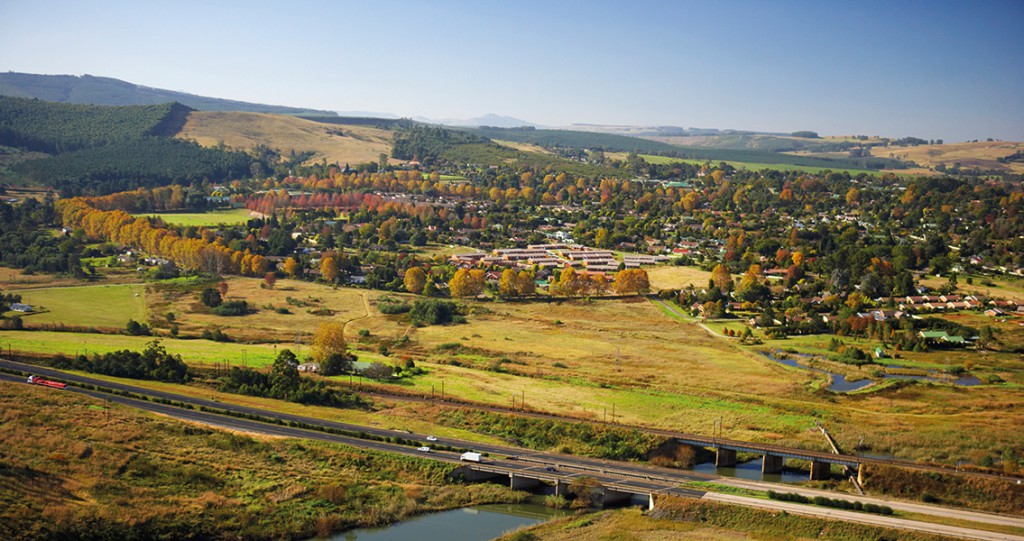
‘Take her flowers and wine,’ says Billy to Francis. ‘You see, just flowers would be too soft, and you don’t want to seem meek; but just wine is a little too hard, a little too impersonal. The combination is perfect because you’re showing her that you know her, you know what she likes. What kind of wine does she like?’
Francis laughs quietly, ‘I don’t know.’ The two are sitting opposite each other at a table on the stoep of pub and restaurant 68 on Main in Howick. Their conversation flows, lubricated by Billy’s white wine and Francis’s Hunter’s Dry.
‘I asked to keep the alcohol on a separate tab,’ says Billy. ‘We don’t want the boss to think we’re on some sort of a booze cruise! Is it easy to get back on to the N3 in the morning?’
Francis assures him it is. This is the extent of many people’s experience of the quiet Midlands town. It’s a stretch of the legs off the main artery joining Durban and Johannesburg; maybe a meal, a conversation with a colleague and a good night’s sleep. Those who arrive with evening light to spare might pop down to the falls at the bottom of town.
Here they’ll watch the water plummet down a 95-metre drop, its steady gush forming a mellow backing track to a Rasta’s happy strumming on his not-quite-tuned guitar. Most will side-step the curio stalls on the way back to their cars, avoiding the gaze of optimistic Zimbabwean craftsmen.
‘No thanks, not today.’
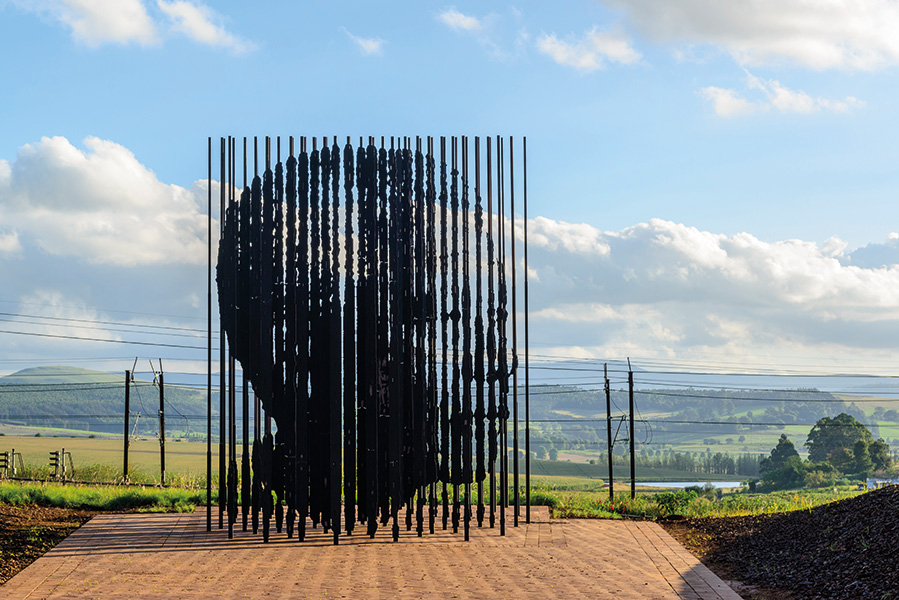
When viewed from directly in front, the cluster of columns set at different depths align to create a perfect portrait of Nelson Mandela.
No place can survive on one-night stands alone though, and nowhere is this more evident than in Big John Clothing Company, right on the main road. On my first afternoon in town, I pop in out of curiosity – there’s a huge poster of a surfer on the outer façade, and we’re about 100 kilometres from the coast.
‘Ja, the vaalies will stop on their way through because we offer pretty good deals on surf brands,’ explains owner Ian Johnson.
This is clearly not the store’s main market though. Racks upon racks hold every shade of green, khaki and camouflage. A selection of toddler-sized camo outfits catches my eye, but it’s at the other end of the spectrum that Big John’s specialises, selling in sizes up to 12XL. That’s extra extra extra extra extra extra extra extra extra extra extra extra large.
Johnson was a farm manager before he opened the store just over 20 years ago, filling a gap in a market with high demand. Howick is surrounded by agricultural land from picturesque Frieslanddotted dairy farms to thick plantations of gum and pine. It’s a rule as old as agriculture itself: where there are farms, there will be big okes who need khaki clothes.
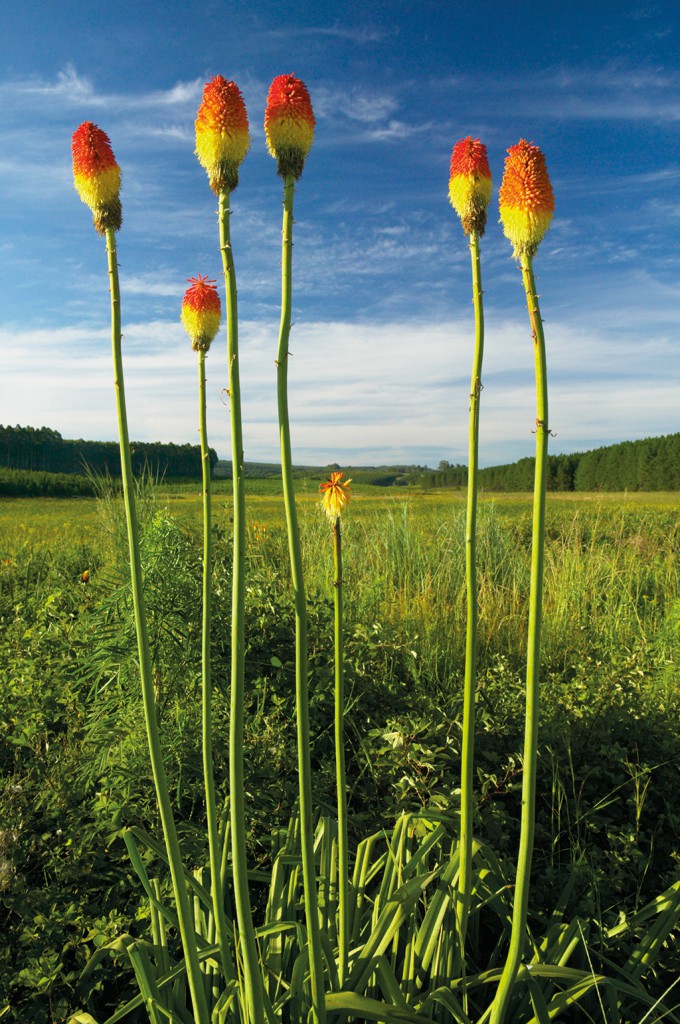
Green fields and blue skies typify the countryside around Howick in the summer, with the odd burst of orange.
It’s also in Big John’s that I first hear the phrase that’ll be uttered countless times to me by locals over the next few days.
‘This is the place for the newly wed and the nearly dead,’ quickly followed by ‘don’t quote me on that.’
The hills immediately behind Howick are covered in little green-roofed boxes made of face-brick ticky tacky. Apparently retirement villages are called ‘mature lifestyle estates’ these days. As I drive up the main street from Big John’s, I wonder what on Earth the ‘mature lifestyle’ entails. It doesn’t take long to figure out. The Catholic, Presbyterian, Methodist, Community and Christ churches are all within two kilometres of each other on the left-hand side. On the right, signs for physiotherapists, ophthalmologists and orthopaedic surgeons abound.
Hang on to this life and prepare for what lies beyond, it seems. Fair enough. This quiet little town is the perfect place to do both. But what do the not-yet-aged do?
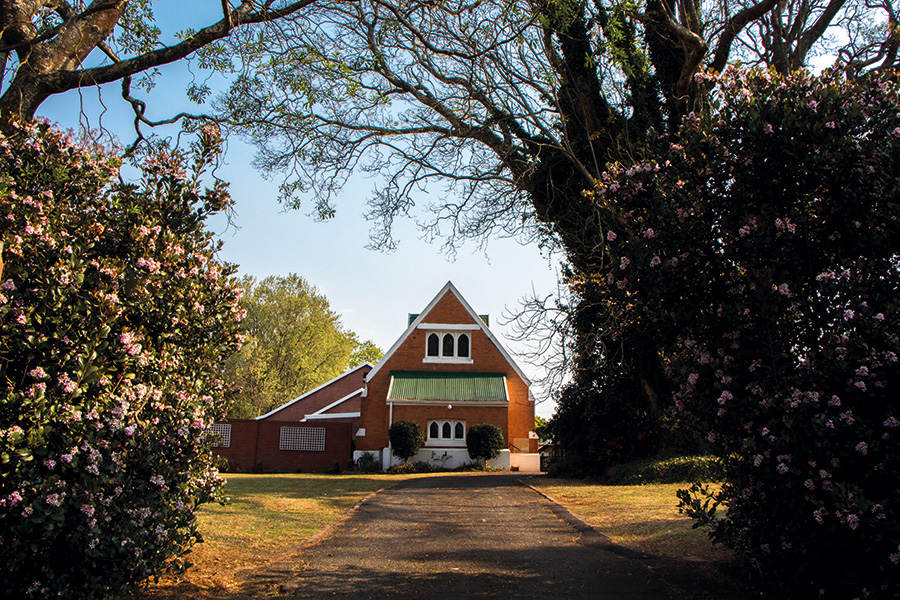
The Presbyterian Church is one of many in the main road.
On Wednesday afternoon I walk alone through the Sappi plantations, a short distance north of the town, to the Karkloof Falls. There’s no N3 truck hum here. Instead, rustling leaves of young blue gums track the progress of a gentle breeze in a Mexican wave like roar. Face-brick is replaced by huge slabs of river rock, green corrugated roofs by pine needles. I get to the grassy river bank, upstream from the falls, and seriously consider taking off my clothes for a swim. With its view down the valley and its isolated place in the hills, this is just too good a skinny-dipping spot to ignore.
The countryside around here will take some serious exploring, I think to myself. Later on, I’m at Delish-Dish, a bar and restaurant towards the top of the main road. After a tasty curry, I order a well-priced glass of Jameson at the bar. I ask about the building and am soon introduced to owner Chris Raubenheimer, whose relative youth is pleasantly surprising (in his early thirties, I guess). He tells me the building was completed in 1901 and was originally the steel mill where wagon drivers would come to repair wheels en route through town.
I soon meet Iain, a regular customer turned head gardener who is helping Chris grow everything from lettuce to artichokes in a new veggie patch in the back garden. As the evening draws on and the kitchen closes, more mates steadily gather on the slate stoep. Before long, there’s a jovial group, all between the ages of 25 and 40, enjoying beers and a cheeky tequila before midweek karaoke at the pub down the road.
‘I did my chef’s training in Cape Town,’ Chris says, ‘but decided to exchange the lifestyle there for the way of life here.’ This seems to be the consensus. Things are simpler here. You might grow a beard that would make many a Cape Town hipster hate themselves, but you don’t squeeze into skinny jeans to go with it; you wear rugby shorts because you like to, and nobody cares what you’re wearing anyway.
Plan your trip to Howick
Getting there
Howick is about an hour north along the N3 from Durban. You can leave the highway at either of two off-ramps, depending on your choice of supermarket. The southernmost (signposted for Howick and Midmar) will take you past a Pick n Pay centre, while the northerly (signposted for Howick North and Tweedie) passes a Kwik Spar.
Things to do in Howick
1. Zip lining
Zip through the treetops of the second largest indigenous forest in South Africa, with Karkloof Canopy Tours. Eight zip lines ranging between 40 and 180 metres in length carry you above, between and below the branches of the Karkloof forest, a 20-minute drive out of town to the north. The uppermost point of the tour has a beautiful view over the surrounding farmlands, and there’s a good chance of seeing rare samango monkeys.
Costs: R595 per person, including a light lunch
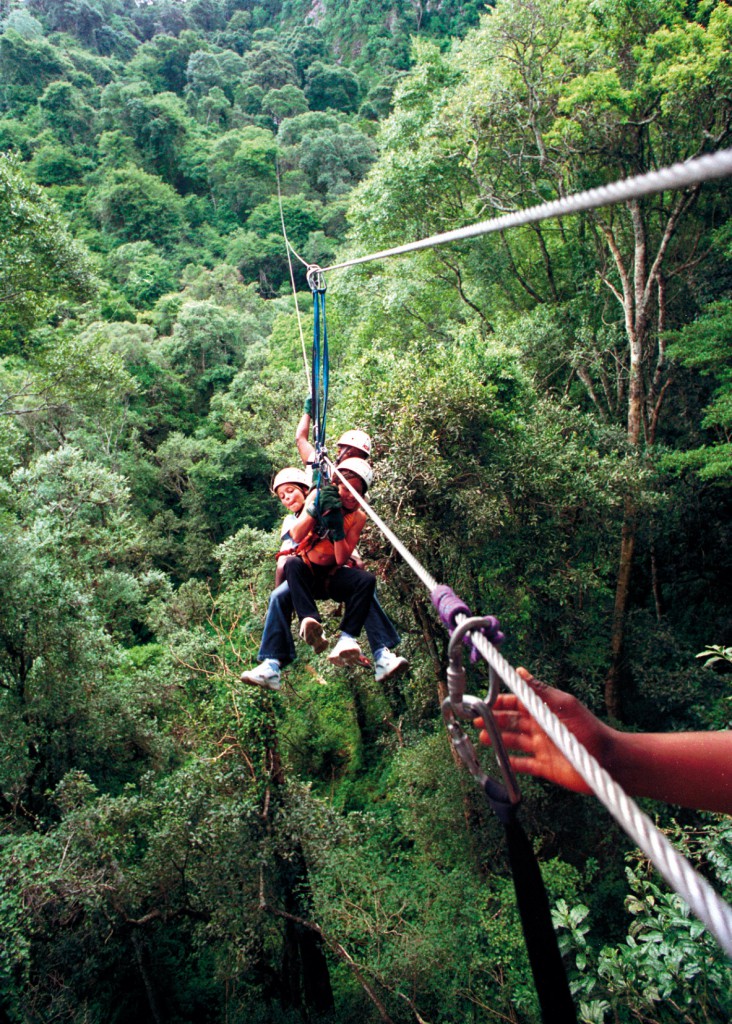
Adrenaline junkies zip through the canopy of the second largest indigenous forest in the country with Karkloof Canopy Tours.
2. Picnicking
Picnic in the plantations at Karkloof Falls. You won’t get as close to the edge, but for tranquil scenery, these 105-metre-high falls offer a great alternative to those in the middle of Howick. Drive 10 minutes along the Karkloof road before turning right on to dirt roads through Sappi plantations. Five kilometres on, you’ll see the falls in the valley ahead of you. Get out and stroll for 15 minutes from here along the cul de sac to the top, and enjoy a spot of lunch on the lawns beside the river upstream.
3. Do a blacksmith’s course
Learn to bend steel on a day-long blacksmith’s course with Sterlings Wrought Iron, at Piggly Wiggly Country Village. With 20 years’ experience in the craft, Guy Sterling will show you how to make a variety of products, from candlesticks to fruit bowls, all of which you’ll take home when you’re done.
Costs: From R1 950 per person for a day-long course including all materials and safety gear, the 10 products you produce, teas and a light lunch.
Where to eat in Howick
1. The Black Olive
A few hundred metres from Howick Falls, this small restaurant and coffee shop is perfect for a quick bite if you’re passing through town. Simple, good food, made quickly and at a good price. Closed on Mondays.
Contact: 0333306748
2. Yellowwood Cafe and Restaurant
Eat in the gardens of the grand stone farmhouse built in 1870, under the shade of a towering syringa tree. Kids can interact with a variety of farmyard animals in the paddock in front of the restaurant, from pot-belly pigs to rare miniature donkeys. There is also a view across the valley to Howick Falls. The menu boasts everything from delicious chicken and pesto tramezzini to famous chocolate mousse cake. Closed on Mondays.
Contact: Tel 0333302461
3. Delish-Dish
Wood-fired pizzas, highly recommended steaks and veggies fresh out of the garden. You’ll pay R20 for a Black Label draught and enjoy it on high wooden stools around the bar. Kids can run riot on the jungle gym and trampoline in the garden. Open daily from breakfast to dinner.
Contact: Tel 0333305036
Where to stay
1. Biggy Best Cottages and Corporate Accommodation
Biggy Best Cottages and Corporate Accommodation offers the closest thing you’ll find to a modern hotel room in the town. Set in beautiful big gardens, all suites have flat screen TVs with SABC and M-Net, en-suite bathrooms, comfortable beds (twin or king size), and tea/coffee making facilities. There are also homely cottages on the property, more suitable to families. When these opened in 1993, owner Thereza Channing gave select lucky guests lifetime vouchers for the same price, which she still honours 20 years on, charging B&B for R75 a night.
Costs: For those who didn’t get in early, rooms cost R600 per night (sleeping two), with optional breakfast for R50 per person.
2. Umgeni Valley Nature Reserve
The headquarters of Wessa (the Wildlife and Environment Society of South Africa) are located in this 900-hectare reserve, spanning the Umgeni River valley, downstream of the Howick Falls. Among other options, Wessa operates three self-catering cottages accommodating between two and six people, with beautiful views over the valley. Hepburn Cottage has the best views and a fireplace for chilly nights, while Mhlangeni is the most secluded.
Costs: R280 per adult per night, and R130 per child per night with a one-off conservation levy of R25 per adult and R12,50 per child.
Contact: 0333303941
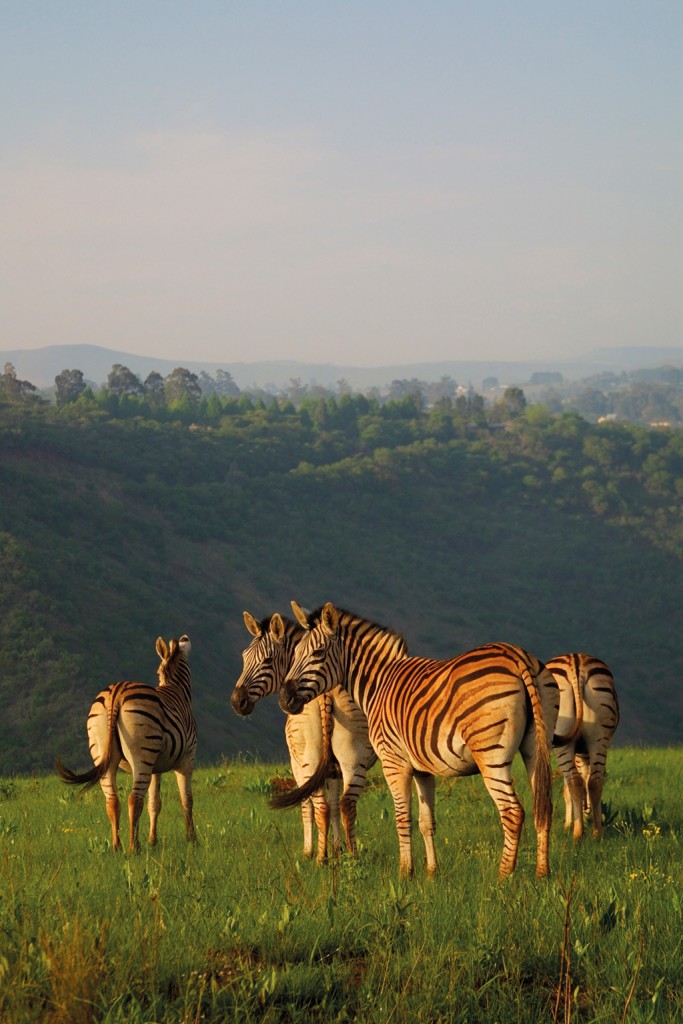
Zebra are among the animals, including aardvark and leopard, found in Umgeni Valley Nature Reserve.
3. Lions River Country Cottages
Lions River Country Cottages offer a taste of country life without having to venture too far off the beaten track. A 10-minute drive out of Howick, there’s an air of estate living as you follow the driveway to the main house. Three ornately decorated self-catering cottages and a guest suite attached to the house accommodate between three and six people. All have DStv and fireplaces.
Costs: From R440 per person per night.
Please note that this article first appeared in the November 2014 issue of Getaway magazine. All prices were correct at time of publication, but may have changed since. Please check with the establishments before travelling.
You may also like
Related Posts
A cosy cabin is bliss in winter. All you need is a fireplace and a...
read more
A stay at Chobe Water Villas gives you a front-row seat to the fascinating ecosystem...
read more
Highlands Mountain Retreat to be a rare find: it offers self-catering accommodation designed for guests...
read more